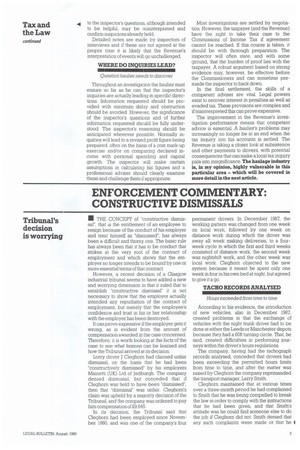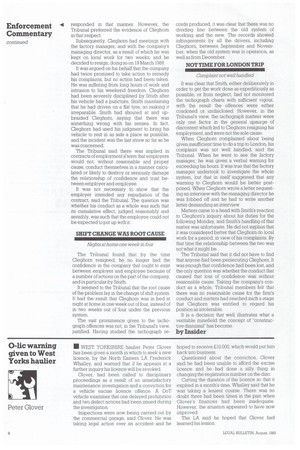ENFORCEMENT COMMENTARY: CONSTRUCTIVE DISMISSALS
Page 97

Page 98

If you've noticed an error in this article please click here to report it so we can fix it.
• THE CONCEPT of "constructive dismissal", that is the entitlement of an employee to resign because of the conduct of his employer and teat himself as "dismissed", has always been a difficult and thorny one. The basic rule has always been that it has to be conduct that strikes at the very root of the contract of employment and which shows that the employer no longer intends to be bound by one or more essential terms of that contract.
However, a recent decision of a Glasgow industrial tribunal seems to have added a new and worrying dimension in that it ruled that to establish "constructive dismissal" it is not necessary to show that the employer actually intended any repudiation of the contract of employment, but merely that the employee's confidence and trust in his or her relationship with the employer has been destroyed.
It can prove expensive if the employer gets it wrong, as is evident from the amount of compensation awarded in the case concerned. Therefore, it is worth looking at the facts of the case to see what lessons can be learned and how the Tribunal arrived at its decision.
Lorry driver J Cleghom had claimed unfair dismissal, on the basis that he had been "constructively dismissed" by his employers Mainetti (UK) Ltd of Jedburgh. The company denied dismissal, but conceded that if Cleghorn was held to have been "dismissed", then that "dismissal" was unfair. Cleghom's claim was upheld by a majority decision of the Tribunal, and the company was ordered to pay him compensation of £.9,645, In its decision, the Tribunal said that Cleghorn had been employed since November 1980, and was one of the company's four permanent drivers, In December 1987, the working pattern was changed from one week on local work, followed by one week on distance work during which the driver was away all week making deliveries, to a fourweek cycle in which the first and third weeks consisted of distance work, the second week was nightshift work, and the other week was local work. Cleghom objected to the new system because it meant he spent only one week in four in his own bed at night, but agreed to give it a go.
TACHO RECORDS ANALYSED Hours exceeded from time to time According to his evidence, the introduction of new vehicles, also in December 1987, created problems in that the exchange of vehicles with the night trunk driver had to be done at either the Leeds or Manchester depots because they had a 60ft turning circle. That, he said, created difficulties in performing journeys within the driver's hours regulations.
The company, having had the tachograph records analysed, conceded that drivers had been exceeding the permitted hours limits from time to time, and after the matter was raised by Cleghorn the company reprimanded the transport manager, Larry Smith, Cleghom maintained that at various times over a three-month period he had complained to Smith that he was being compelled to break the law in order to comply with the instructions that he had been given, and that Smith's attitude was he could find someone else to do the job if Cleghorn did not. Smith denied that any such complaints were made or that he I
• responded in that manner. However, the Tribunal preferred the evidence of Cleghorn in that respect.
Subsequently, Cleghorn had meetings with the factory manager, and with the company's managing director, as a result of which he was kept on local work for two weeks, and he decided to resign, doing so on 19 March 1988.
It was argued on his behalf that the company had twice promised to take action to remedy his complaints, but no action had been taken. He was suffering from long hours of work and intrusion to his weekend freedom. Cleghorn had been severely disciplined by Smith after his vehicle had a puncture, Smith maintaining that he had driven on a flat tyre, so making it irreparable. Smith had shouted at and upbraided Cleghorn, saying that there was something wrong with his senses. In fact, Cleghorn had used his judgment to bring his vehicle to rest in as safe a place as possible, and the incident was the last straw so far as he was concerned.
The Tribunal said there was implied in contracts of employment a term that employers would not, without reasonable and proper cause, conduct themselves in a manner calculated or likely to destroy or seriously damage the relationship of confidence and trust between employer and employee.
It was not necessary to show that the employer intended any repudiation of the contract, said the Tribunal. The question was whether his conduct as a whole was such that its cumulative effect, judged reasonably and sensibly, was such that the employee could not be expected to put up with it.
SHIFT CHANGE WAS ROOT CAUSE Nights at home one week in four The Tribunal found that by the time Cleghorn resigned, he no longer had the confidence in the company that ought to exist between employer and employee because of a number of actions on the part of the company, and in particular by Smith.
It seemed to the Tribunal that the root cause of the problem lay in the change of shift system. It had the result that Cleghorn was in bed at night at home in one week out of four, instead of in two weeks out of four under the previous system.
The vast prominence given to the tachograph offences was not, in the Tribunal's view, justified. Having studied the tachograph re cords produced, it was clear that there was no dividing line between the old system of working and the new. The records showed infringements by all the drivers, including Cleghorn, between September and November, when the old system was in operation, as well as from December.
NOT TIME FOR LONDON TRIP
Complaint not well handled It was clear that Smith, either deliberately in order to get the work done as expeditiously as possible, or from neglect, had not monitored the tachograph charts with sufficient vigour, with the result the offences were either condoned or undisclosed. However, in the Tribunal's view, the tachograph matters were only one factor in the general upsurge of discontent which led to Cleghorn resigning his employment, and were not the sole cause.
When Cleghorn complained about being given insufficient time to do a trip to London, his complaint was not well handled, said the Tribunal. When he went to see the factory manager, he was given a verbal warning for exceeding his hours. It was true that the factory manager undertook to investigate the whole system, but that in itself suggested that any warning to Cleghorn would be better postponed. When Cleghorn wrote a letter requesting an interview with the managing director he was fobbed off and he had to write another letter demanding an interview.
Matters came to a head with Smith's reaction to Cleghom's inquiry about his duties for the following Monday, and Smith's handling of that matter was unfortunate. He did not explain that it was considered better that Cleghorn do local work for a period, in view of his complaints. By that time the relationship between the two was not what it might be.
The Tribunal said that it did not have to find that anyone had been persecuting Cleghorn. It was enough that confidence had been lost, and the only question was whether the conduct that caused that loss of confidence was without reasonable cause. Taking the company's conduct as a whole, Tribunal members felt that there was no reasonable cause for the firm's conduct and matters had reached such a stage that Cleghom was entitled to regard his position as intolerable.
It is a decision that well illustrates what a veritable minefield the concept of "constructive dismissal" has become.
by Insider




































































































